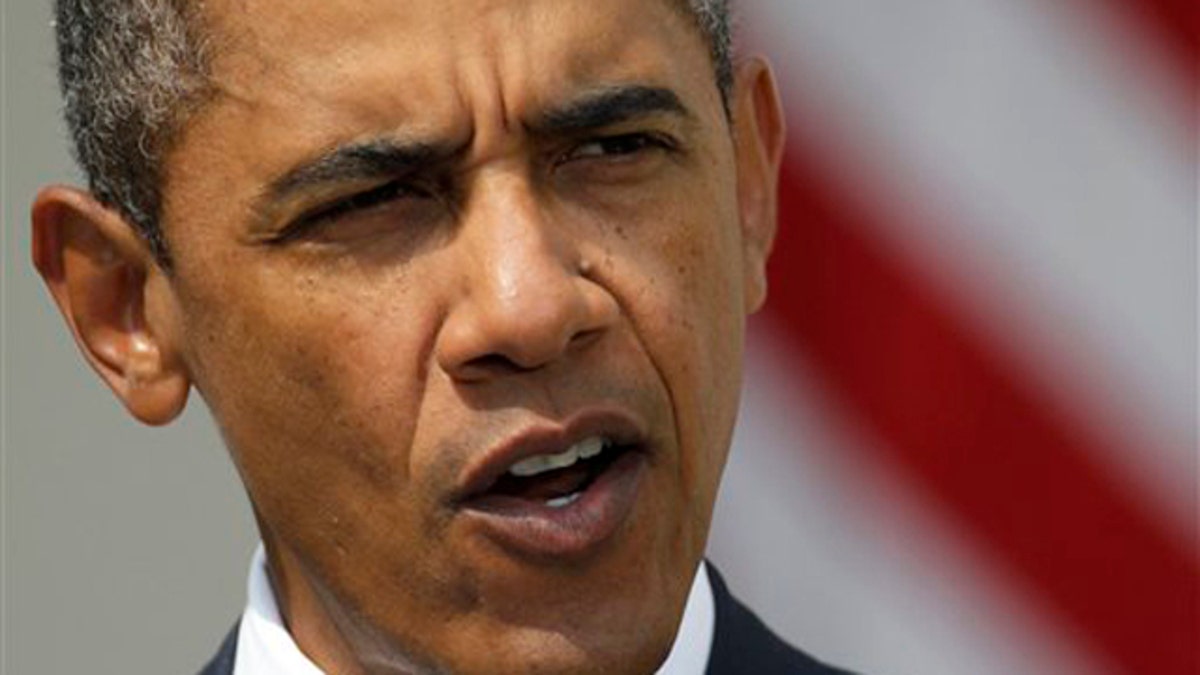
President Barack Obama announces his selection of Alan Krueger as chairman of the Council of Economic Advisers, Monday, Aug. 29, 2011, in the Rose Garden of the White House in Washington. (AP)
WASHINGTON – President Barack Obama, hamstrung by budget cuts and a tight debt ceiling, is preparing a September jobs package with limited tools at his disposal to prime the economy and crank up employment.
At a minimum, the president's plan will call on Congress to extend current payroll tax cuts and jobless benefits, spend money for new construction projects and offer incentives to businesses to hire more workers. But economists say that while that would eliminate some drag on the economy and maintain the status quo, it won't be enough to propel it to new heights.
The president's plan, which he will announce in a major speech next week, will be far less ambitious than the $825 billion stimulus of 2009, passed when the economy was still shrinking and when unemployment stood at 8.2 percent. Now the economy is growing sluggishly, but unemployment is a full percentage point higher -- 9.2 percent for July.
Economists who advocate for government intervention in the economy estimate that it would take a package of at least $300 billion to avoid backsliding and even more to give the economy a lift.
That's a tall order for a president facing a divided Congress where Republicans, demanding fiscal austerity, reject the notion that short-term infusions of taxpayer money into the economy can prod a sluggish recovery. Even without Republican opposition, such a level of spending would require short-term borrowing that would move the government closer to its new debt ceiling before the November 2012 election, something Obama is determined to avoid.
The president's speech will set the stage for the economic debate to come in Congress. A congressional supercommittee has been given the job of finding at least $1.5 trillion in deficit reduction. As part of his economic plan, Obama plans to propose even more deficit reduction to help pay for the up-front cost of his jobs initiatives.
The listless economy, which has left millions of Americans out of work and threatens the savings of millions more, is the biggest obstacle facing Obama's re-election. Making the case for his economic programs will be central to the remaining 18 months of his term.
"Our great challenge as a nation remains how to get this economy growing faster," Obama said Monday. "That's our urgent mission."
The president is certain to call for extending a one-year payroll tax cut for workers and unemployment benefits that expire in January, at a combined cost of about $175 billion. He also has lent support to a proposal to create an "infrastructure bank," a fund that would be seeded by the government but fed by private investment to pay for major road, bridge and other public construction. Even advocates of the plan, however, say that proposal would not likely be in place to generate jobs for about two years.
Mark Zandi, the chief economist at Moody's Analytics who has advised Republicans and Democrats, said that without government action, the private sector would have to grow by more than 4 percent to generate enough jobs to keep unemployment from rising.
"That seems like a heavy lift at this juncture," he said.
Bernstein said that if Congress fails to renew the payroll tax cut and unemployment benefits, the jobless rate would likely remain unchanged by the end of next year.
"If they renew them, we have a better chance of a jobless rate that's 8.5 or below, which isn't great either, but is a whole lot better than 9," he said.
Obama's plan is likely to be found lacking on both ends of the political spectrum.
Republicans say Obama should focus on cutting taxes for corporations and reducing regulatory burdens, steps that they say will free the private sector to spend and hire. Several have said they would oppose extending the one-year payroll tax cut enacted in December, even if that would be the equivalent of a tax increase on workers.




